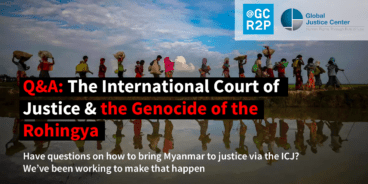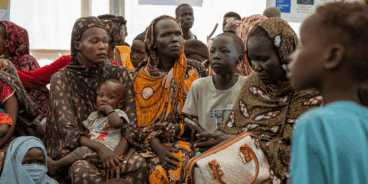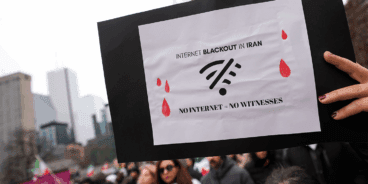
Atrocity Alert No. 156: Cameroon, Myanmar (Burma) and Central African Republic
Atrocity Alert is a weekly publication by the Global Centre for the Responsibility to Protect highlighting situations where populations are at risk of, or are enduring, mass atrocity crimes.
Conflict in Cameroon “risks spiraling completely out of control”
On 15 May soldiers from Cameroon’s Air Force and Rapid Intervention Battalion attacked the city of Bamenda, the capital of the Anglophone north-west region, reportedly burning down approximately 70 homes and shops, and executing at least one person in the street. Satellite imagery acquired by Human Rights Watch – as well as eyewitness reports and other evidence – appears to show dozens of burned buildings and extensive property damage in the Mankon area. The attack was reportedly in reprisal for Anglophone separatists killing two Cameroonian soldiers earlier that day.
Armed conflict continues between the Cameroonian government and Anglophone separatists in the country’s north-west and south-west regions. Since October 2017 there has been mounting evidence of government security forces perpetrating extrajudicial killings and torture. More than 170 villages have also been burned or otherwise destroyed over the past two years. Armed separatists have also perpetrated abuses, including kidnapping and killing civilians.
At least 650 civilians, 235 members of the security forces, and nearly 1,000 alleged separatists have been killed as a result of the ongoing conflict. More than 530,000 people have been displaced in the Anglophone regions.
On 13 May the UN Security Council held an informal Arria Formula meeting to discuss the humanitarian crisis in Cameroon, but the Council has not directly addressed the armed conflict, despite it having already lasted more than 18 months. On 6 May the UN High Commissioner for Human Rights, Michelle Bachelet, argued that “there is a clear – if possibly short – window of opportunity to arrest the crisis” and that if timely preventive action is not taken, then the conflict in Cameroon “risks spiraling completely out of control.”
With the assistance of the Office of the UN High Commissioner for Human Rights, the government should immediately investigate the Bamenda attack and hold all those responsible for the wanton destruction of civilian homes and property accountable. The security forces must end extrajudicial killings and ensure that the human rights of all Cameroonians are equally protected, regardless of language, cultural identity or political affiliation. Armed separatists must also be held accountable for their actions in accordance with international humanitarian and human rights law.
All UN member states and regional organizations should suspend military aid to Cameroon until it has made demonstrable progress towards ending the conflict in the Anglophone regions.
Myanmar faces possible genocide case at International Court of Justice
On Sunday, 26 May, Reuters reported that seven soldiers who were imprisoned for the killing of 10 Rohingya men and boys in Inn Din village, Myanmar, were released after serving less than a year of their 10-year sentence. The soldiers, who were released in November 2018, were in prison for less time than award-winning Reuters journalists Wa Lone and Kyaw Soe Oo, who were imprisoned for 16 months for exposing the massacre.
The freed soldiers are the only members of Myanmar’s security forces who have received prison sentences for atrocities committed against the minority Rohingya population during so-called “clearance operations” in Rakhine State that started in August 2017. These operations included the widespread killing of civilians, as well as torture, rape and the burning of nearly 400 Rohingya villages. The government has rejected the conclusion of an Independent International Fact-Finding Mission (FFM) that its security forces committed crimes against humanity and war crimes, as well as acts of genocide in Rakhine State. However, Radika Coomaraswamy, a member of the FFM, has argued that “acknowledging that human rights violations have been committed, holding people accountable and reforming the Tatmadaw (Army) is the only way forward.”
Earlier this month the Foreign Minister of The Gambia, Dr. Mamadou Tangara, announced his country’s intention to take the case of the Rohingya to the International Court of Justice (ICJ) in line with a resolution by the 57 member states of the Organisation of Islamic Cooperation. The Gambia and Myanmar are both parties to the Genocide Convention, which grants the ICJ jurisdiction under Article IX and allows any state party to bring a case to the ICJ for breaching the Convention’s obligations. An ICJ case would be an important step towards holding Myanmar responsible for the 2017 genocide against the Rohingya.
Ending impunity for individual perpetrators also remains essential. The UN Security Council should immediately refer the situation in Myanmar to the International Criminal Court or create an ad hoc international criminal tribunal. States should also support the work of the UN’s new Independent Investigative Mechanism on Myanmar.
Massacre jeopardizes fragile peace process in Central African Republic
On 21 May members of the 3R (Retour, Réclamation et Réhabilitation) armed group in Central African Republic (CAR) reportedly attacked the villages of Bohong, Ndjondjom and Koundjili, in the Ouham-Pendé region. The UN Peacekeeping Mission in CAR (MINUSCA), strongly condemned the “cruel and deliberate character of these attacks, which, in addition to being planned and coordinated, show the intention of perpetrators to commit atrocities intended to kill a large part of the population present in these villages.” According to Médecins Sans Frontières, 39 civilians were killed in the attacks. One day prior to the violence in Ouham-Pendé, an elderly nun was also targeted and beheaded in the southwest of the country, although it remains unclear who was responsible.
The attacks in the Ouham-Pendé region constitute a major escalation of violence since the signing of a peace agreement between the government and 14 armed groups, including 3R, on 6 February. The national government has called upon 3R’s leader, Sidiki Abass, to hand over those responsible. Following the February peace deal, Abass was named as a special military adviser to the government alongside two leaders of other armed groups that have also targeted and killed civilians in the past.
Last week’s violence demonstrates that populations in CAR face an ongoing risk of mass atrocity crimes. The attacks also highlight the need for a rigorous disarmament and demobilization process, and raise questions about the commitment of signatories to the February agreement, which was negotiated under the African Union-led “African Initiative for Peace and Reconciliation.” The UN Security Council and the African Union should immediately impose targeted sanctions on any individuals responsible for breaches of the agreement, including those holding public office.
Read Next

Related Publications

Expert Voices on Atrocity Prevention Episode 52: Tom Andrews

Atrocity Alert No. 467: South Sudan, Israel and the Occupied Palestinian Territory and Venezuela
